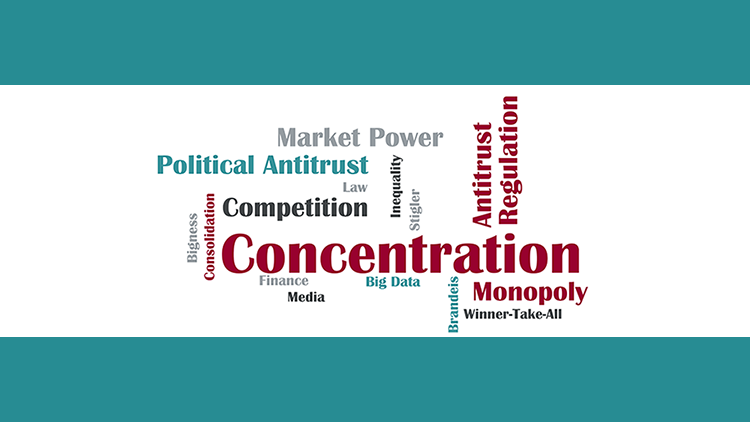In this installment of ProMarket’s interview series on concentration in America, Chicago Booth professor Steven Kaplan discusses the reasons for the rise in concentration. “Overall, the increases in concentration from technology and regulation are positive while the increase from rent seeking is a negative.”
Does America have a concentration problem? On March 27-29, the Stigler Center hosted a first-of-its-kind, three-day conference in Chicago that focused on this very question.
The conference brought together dozens of top academics from law, economics, history, and political science, policymakers, journalists, and public intellectuals. Ahead of this conference, we presented influential scholars and thinkers with some questions on concentration, market power, and bigness—and their potential effects on the U.S. economy.
You can read all previous installments here.

Steven Neil Kaplan is the Neubauer Family Professor of Entrepreneurship and Finance at the University of Chicago Booth School of Business. His research focuses on issues in private equity, venture capital, entrepreneurial finance, corporate governance, and corporate finance. Kaplan co-founded the entrepreneurship program at Booth, and was named one of the top 12 business school teachers in the U.S. by BusinessWeek.
In a brief interview with ProMarket, Kaplan shared some thoughts on concentration, market power, and the U.S. economy.
Q: The discourse on concentration, market power, and bigness in many U.S. industries has increased dramatically in the last year. Do you believe that we have enough empirical evidence to show that concentration is on the rise and having adverse effects on the economy?
My understanding is that there is good evidence that concentration has increased. We do not have much evidence that it has adversely affected the economy where the economy is the world economy.
Globally, the world economy has flourished over the last 35 years as concentration has increased. Angus Deaton wrote in 2013: “Life is better now than at almost any time in history. More people are richer and fewer people live in dire poverty. Lives are longer and parents no longer routinely watch a quarter of their children die.”
How could he say that? According to the World Bank, in 1980, the number of people living in extreme poverty globally was about 2 billion, some 44 percent of the world’s population, which then numbered around 4.5 billion. By 2012, that figure had fallen to less than 900 million, or about 13 percent of the global population of 7 billion. Recently, the World Bank projected that for the first time, the number of people living in extreme poverty around the globe was expected to have fallen below 10 percent.
Average life expectancies also have increased markedly since 1980 in every region of the world, including the U.S.
While many factors have contributed to these results, three stand out: technology, globalization, and free markets. Billions of people are better off in India, China, Africa and elsewhere because they moved to market economies that have benefited from technology and globalization.
The successes of free markets, technology and globalization, however, have not been uniform. People in developed countries with less skill and less education have not benefited as much and, some have been harmed. And, in fact, we have seen life expectancies decline for some of those groups. That has contributed to some of the recent political turmoil here and in Europe.
Q: In your opinion, what are the main reasons for the rise in concentration?
I suspect the major reason for the rise in concentration is technological change, particularly in information technology. The most visible examples are in the technology sector—Apple, Facebook, Google, etc. But technology likely has contributed to increased concentration elsewhere—retail (Amazon and Wal-Mart have made early and wide use of technology) and financial services (the large banks and the large asset managers have invested heavily in technology). The increase in concentration from technology has almost certainly been positive.
Two other reasons probably matter:
The first is increased regulation. Regulations have increased markedly over the last twenty years, and particularly over the last ten years, in the developed countries. Regulations can lead to increased concentration in two ways. First, regulations and the resources needed to deal with them have a major fixed component—hiring legal and compliance staff and implementing legal and compliance systems. This creates an advantage for larger companies. My suspicion is that the fixed costs are large and have gotten larger over time. Second, my guess is regulations—particularly those that affect hiring—tend to favor investments that reduce the need for local labor. Those investments are in technology and globalization. Both of those also favor scale.
The second is increased rent seeking/crony capitalism, which likely interacts with technology and regulation. When the government becomes larger and when regulations increase, the benefit from influencing those regulations increases. And there are likely economies of scale in lobbying and rent seeking.
So, overall, the increases in concentration from technology and regulation are positive while the increase from rent seeking is a negative. At this point, I suspect the increase from technology has been the dominant factor.
Q: Which industries should we be concerned with when we look at questions of concentration?
Those where rent seeking is relatively more important.
Q: Has consolidation in the financial industry played a role in concentration or antitrust issues in the U.S.?
I do not believe so for two reasons:
Anyone who has ever served on the board of a public company or money manager understands that there is no plausible mechanism for this to have occurred.
The empirical evidence here is extremely weak. There are correlations that are not convincing.
Q: The five largest internet and tech companies—Apple, Google, Amazon, Facebook, and Microsoft—have outstanding market share in their markets. Are current antitrust policies and theories able to deal with the potential problems that arise from the dominant positions of these companies and the vast data they collect on users?
It is not clear there is an antitrust problem with Amazon, Apple, Facebook, and Google. Their businesses benefit from network effects, meaning that they become more efficient the more people use them. All four have been spectacularly successful. It also is not at all clear that some other companies will be able to compete with them in the future.
Microsoft came under similar antitrust attack in the late 1990s. Microsoft was, in fact, more vulnerable than most IO economists believed at the time. I’d guess that will be true of today’s tech giants as well.
Q: Is there a connection between the growing inequality in the U.S. and concentration, dominant firms, and winner-take-all markets?
Maybe. Josh Rauh and I argued in “It’s the Market: The Broad-Based Rise in the Return to Top Talent” in the Journal of Economic Perspectives in 2013. We concluded that “the U.S. evidence on income and wealth shares for the top 1 percent is most consistent with a ‘superstar’-style explanation rooted in the importance of scale and skill-biased technological change.”
This suggests that winner-take-all markets (driven by technology and scale) play a role in inequality.
However, they may not play the most important role. A new paper by Smith, Yagan, Zidar, and Zwick finds that the business income growth accounts for nearly all of the rise in top income inequality in the 21st century. Second, business income growth is broad-based across sectors and not concentrated among a few top firms. This suggests a lot of winners earning a lot by becoming very efficient rather than winner-take-all.
Q: President Trump has signaled before and after the election that he may block mergers and go after certain dominant companies. What kind of antitrust policies should we expect from him? Pro-business, pro-competition, or political antitrust?
I think those who say they have a clear idea what the Trump Administration will try to do, let alone what they will be able to implement, are fooling themselves.
That said, I would hope to see tougher antitrust policy where there is an opportunity for increased rent seeking and more lenient antitrust policy where there are economies of scale from technology.






